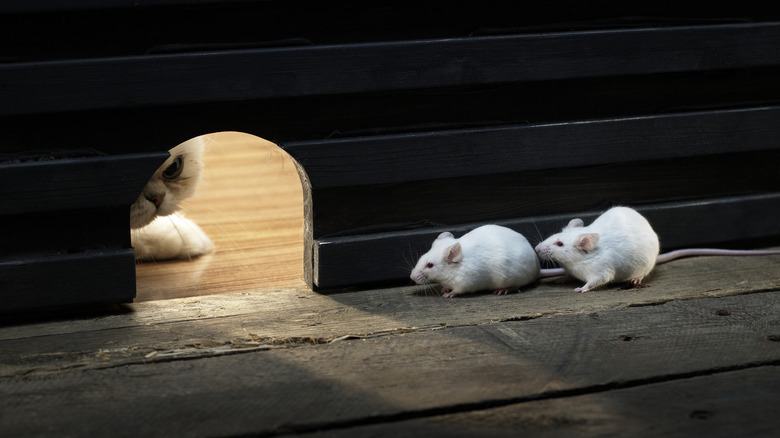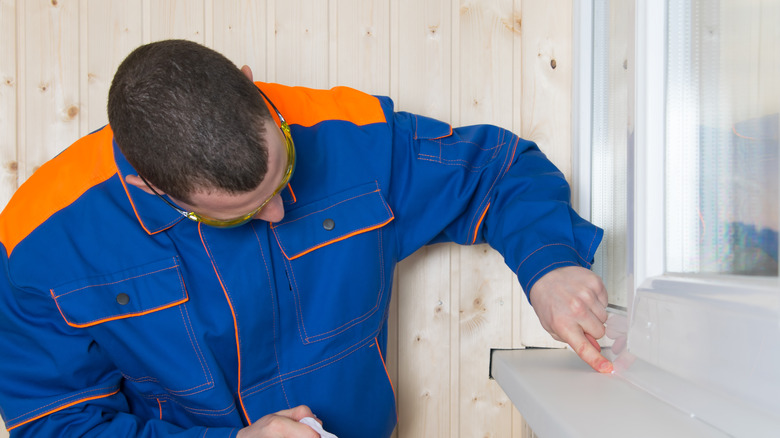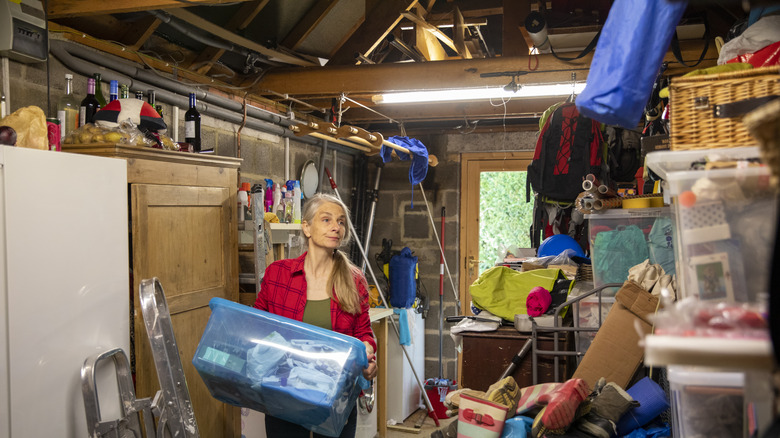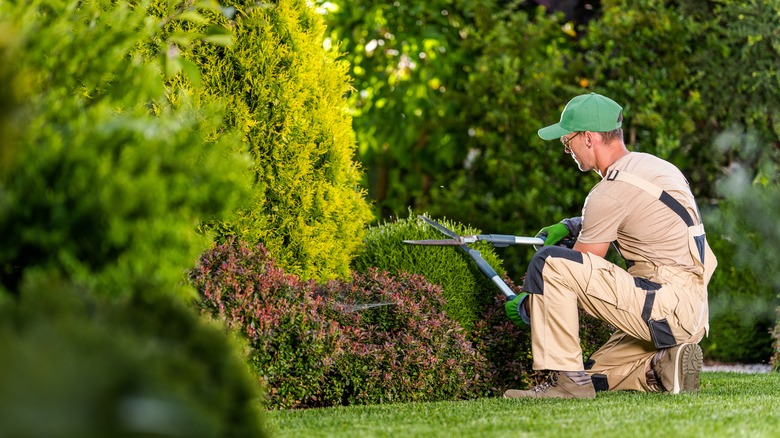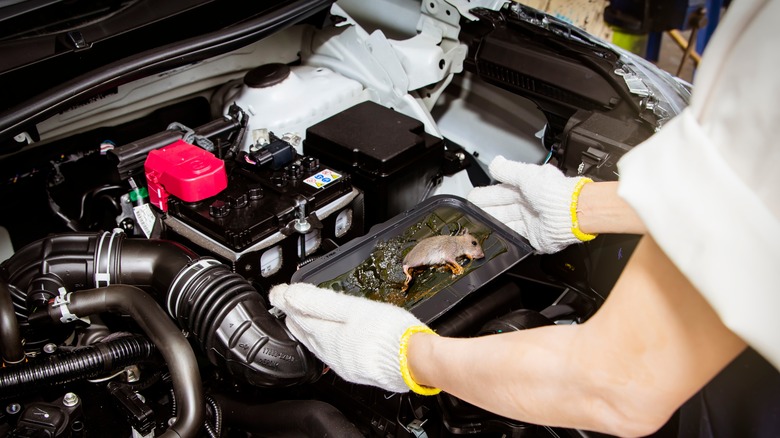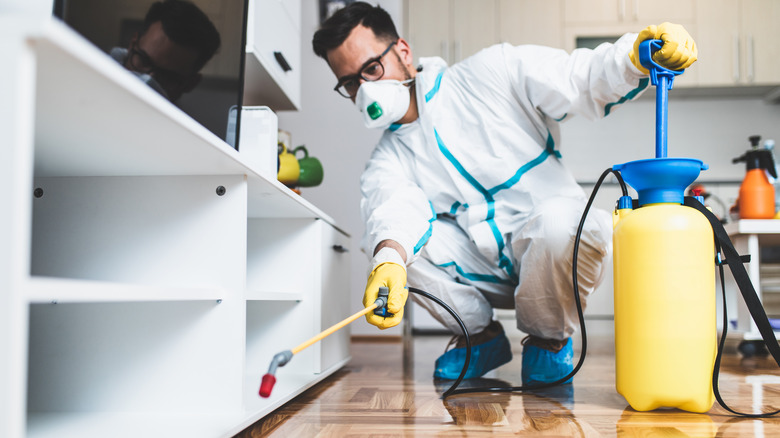5 Proven Tricks To Mouse-Proof Your Car And Garage
For many car owners, it's not uncommon to find mice droppings, nests, or chewed-up wires inside or near your vehicle. While there's a whole list of possible animals that could have made a home out of your car or garage, one of the most common culprits is the mouse.
In 2020, The Washington Post shared that rodents are attracted to our vehicles for many reasons, such as it serving as shelter and warmth during the cold season and its wires providing them stimulation. Unfortunately, their presence in our cars, as well as garages, can lead to disastrous consequences. For example, when mice bite through car wires, it can lead to fuses being blown or sudden fires.
Aside from this, MyHealth Alberta shares that mice can also contaminate our food with their bodily fluids, such as urine and droppings. Mice are also known to hot various types of parasites, such as fleas and mites, which can carry a host of diseases. Thermo Fisher even claims that mouse allergens could potentially lead to asthma and rhinitis, which is a cause of asthma-related symptoms in both cities and suburban areas.
Thankfully, there are a couple of methods you can try to keep them away from your cars and garages. Here's how.
Seal entry points
As always, prevention is better than cure. For this reason, one of the best ways to mouse-proof your car or garage is simply to prevent them from entering these places at all. For example, one of the most common entry points for mice is through doors and windows. To keep mice from using these openings to get into your car or garage, make sure to keep them closed fully whenever they're not being used.
Pest World shares that house mice are usually 2.5 to 3.75 inches long, which means they can be good at squeezing themselves into tiny holes. Knowing this, it's also best to fill in the gaps in your garage doors and windows with mesh screens, weather-stripping seals, and steel wool. With some house mice being able to fit in spaces as small as 1 centimeter, it also makes sense to seal areas like cracks in the walls or foundation. With this, you'll need to regularly inspect your garage for any holes wherein they can fit.
In vehicles, mice typically enter through vents, holes around the cables, pedal shafts, and steering columns. While you may not be able to completely seal these, you can avoid mice getting into them by not leaving your car parked outdoors for long periods of time, especially if it's near a lot of vegetation.
Keep your car and garage clean
According to the Las Vegas Pest Control, clutter is the perfect nesting spot for mice. Typically, clutter can give mice ample options for shelter and even materials that they can use for building nests. Because cluttered areas are often not noticed for long periods of time, mice can hide in them and breed without much worry.
To prevent mice from making a home in your car and garage, it's best to always make sure they are kept clean and clutter-free. By keeping your garage organized, you can also get a lot more space and find things when you need them faster.
In some cases, mice find their way into our homes because of the scent of improperly stored human or pet food. By investing in sealed storage solutions, you can keep the scent minimal and avoid inviting mice into your car or garage.
In general, it's also recommended to properly seal any opened food, garbage cans, or compost bins. Before leaving your home or vehicle for long periods, such as holidays, properly throwing out any garbage can make it less appealing for mice passing by.
Design an uninhabitable garden
Before mice get into your garage, they often pass through your gardens first. Knowing this, how you maintain your garden can affect how easily rodents access your vehicles. In fact, Sefton Meadows Garden Center shares that gardens are actually ideal habitats for mice, especially in the warmer months of the year. Unfortunately, this doesn't bode well for your plants, leading to things like bite marks on stems and dead seedlings.
To make the journey to your garage and your car more difficult, you need to create an uninhabitable environment for rodents, such as locking away things they can use to build nests and blocking access to food sources.
Similar to other animals, mice use their sense of smell in their decision-making processes a lot. For this reason, you may also want to plant flowers like lavender, daffodil, rosemary, mint, sage, and peppermint. By using plants instead of artificial repellents, you can keep mice away from your garden (and garage) without disturbing the ecosystem.
Use mouse deterrents and traps
While mice can be a handful, it's important to understand that they're still living creatures with thoughts and feelings. With this, it's best to address their presence as humanely as possible. One way to do this is by opting for deterrents first and treating traps that hurt or kill them as a last resort.
To discourage them from entering your car or garage, you can spray or use a diffuser for natural repellents, such as eucalyptus, cedarwood, cloves, cinnamon, peppermint oil, vinegar, and citronella. Alternatively, Fox Pest claims that mice also don't like the smell of ammonia, bleach, or mothballs. However, bear in mind that these items can also put you, your children, or your pets at risk of poisoning if ingested or even inhaled.
If you're not a DIY kind of person, there are also several commercial mouse repellents available in the market. While some come in the form of sprays, there are also ultrasonic mouse repellants that you may want to consider.
Lastly, you can use mouse traps and bait to get rid of the pesky mice. Although traditional mouse traps can be a little morbid, some of the newer mousetraps are significantly less violent. For example, the Rentokill RADAR releases carbon dioxide to suffocate rodents and cause asphyxiation within 45 seconds, which is overall faster and less painful than a regular mouse trap.
Keep your car and garage mouse-free
Unfortunately, keeping your spaces mouse-free isn't a one-time thing. It's an ongoing effort that requires regular inspections throughout the year, especially during the autumn and winter when mice are looking for places to hide from the elements.
Some key signs that mice may have found themselves in your home include mice excrement, nests, and chewed wires. Aside from this, mice can also reveal themselves through unusual sounds and smells from your car or garage. By teaching your family members about these signs, you can have more eyes and ears looking out for potential mouse problems.
With female house mice capable of giving birth to up to six babies every three weeks, it's crucial to deal with mouse infestations as promptly (and humanely) as possible. When all else fails and mice continue to find their way into your vehicles, it may be time to ask for professional help. If you can't manage the mice problem on your own, you should consult a trusted pest control company to finish the job.
